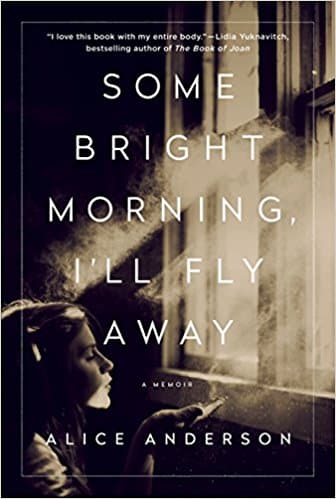Jen Pastiloff here. I’m the founder of The Manifest-Station. Welcome to The Converse-Station: A place where writers interview writers. With the site getting so much traffic, I can think of no better way to utilize that traffic than to introduce the readers to writers I love. The dialogues created within this series have stayed with me long after I’ve read them on the page. Today’s is no different. It’s between Laurie Easter and the amazing Alice Anderson.
By Laurie Easter
Alice Anderson is an award-winning poet and author of the new memoir Some Bright Morning, I’ll Fly Away: A Memoir, published by St. Martin’s Press on August 29, 2017. I met Alice at the AWP conference in Washington DC last February, where I picked up a copy of her breathtaking poetry collection The Watermark. Alice’s writing reflects the spirit and charm of her personality. Honest, straight-forward, and intensely beautiful. Some Bright Morning, I’ll Fly Away is a book that sucks you in and doesn’t let go. Both harrowing and full of love, it is a story of survival, resilience, and redemption that will resonate for a long time to come. It has received rave reviews, including starred reviews from both Kirkus and Booklist. An excerpt from Alice’s memoir Some Bright Morning, I’ll Fly Away can be found online at Good Housekeeping. https://www.goodhousekeeping.com/life/relationships/a45620/some-bright-morning-ill-fly-away-alice-anderson/
Laurie Easter: There is a tendency to classify works of literature. And while some writers may resist labeling their work, taxonomy allows publishers to target a desired audience. For example, some of the sub-genres of memoir include travel memoirs, divorce memoirs, coming-of-age memoirs, etc. One thing I find interesting about your memoir, Some Bright Morning, I’ll Fly Away, is that the book occupies space within many sub-genres. As readers, we get glimpses of the narrator coming of age in scenes from her childhood and young adult life. We witness her in varying locations: Sacramento, Paris, New York, and Mississippi. We experience the multitude of traumas she lives through and observe how she deals with the devastation of childhood sexual abuse, physical pain and suffering from accidents, Hurricane Katrina, mental and emotional abuse by her husband, domestic violence, and the ultimate threat of losing her children. Each one of these narrative threads could categorize the book as a particular type of story—a trauma and redemption story, a navigating the chaos story, a mother’s fierce love story. To me, the one key element that stands out is Resilience. The book is many things, but above all else, I see it as a story of the resilience of not only this one woman and her children, but of human nature and the body. And that resilience gives me hope.
How do you see this story? What kind of narrative is it for you? If you were to distill it down to one key element to label it, what would that look like? Continue Reading…

